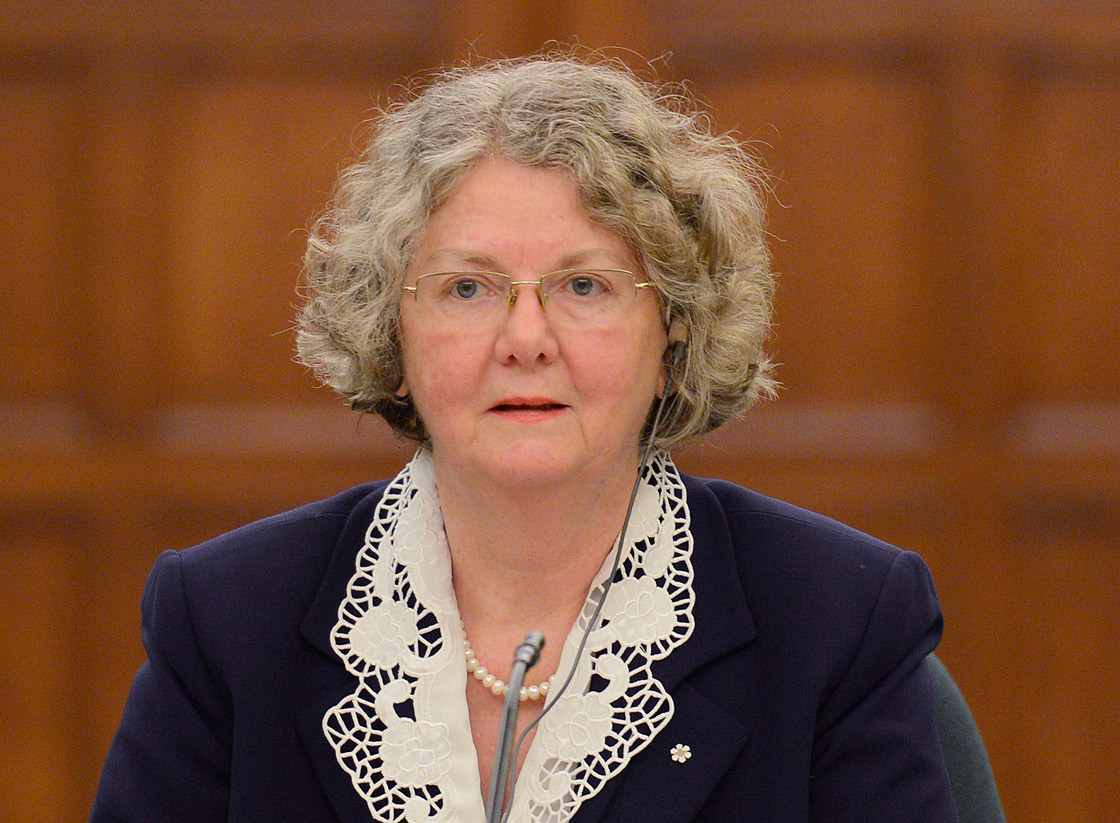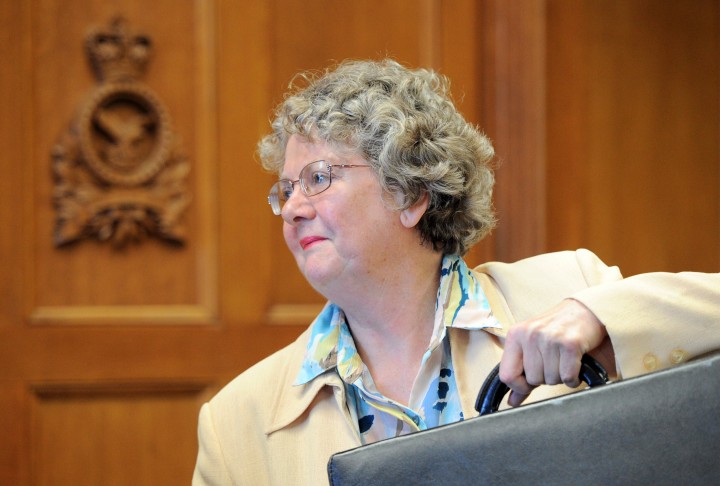This summer, we spoke with Canada’s officers of Parliament. We profile each in an eight-part series. Read them all here.

There is “no end” to the ways in which conflict of interest rules for MPs and other public office-holders could be strengthened, the federal ethics watchdog said. But there is little indication any action will soon be taken.
“There are a lot of issues I have raised,” she said, lifting a thick stack of recommendations off the board table in her Ottawa office. “Some are technical, some are deeper.”
As the conflict of interest and ethics commissioner, Mary Dawson’s job is to keep ministers, MPs, parliamentary secretaries, senior public servants and political staff in check, ensuring they don’t enter a conflict of interest between their public duties and private interests.
“Probably, the most important part (of the Conflict of Interest Act) is that people hold the public interest as being more important than their own private interest,” she said.
Her most recently published report, for example, looked into a hunting trip Christian Paradis took, while he was public works minister, with the former owner of the Quebec Nordiques, Marcel Aubut. At the time of the trip, Aubut was lobbying Ottawa to help fund a new arena in Quebec City. Dawson cleared Paradis after determining the trip was personal in nature and finding no evidence the men had significant discussions about potential arena funding during the trip.
Dawson came to this office in 2007 with close to 40 years in the public sector. Throughout those years, she played a prominent role in Canada’s Constitutional affairs, acting as the final drafter for the 1982 patriation package, which gave Canada sole control over its supreme law. She subsequently was the drafter and principal legal advisor for Constitutional amendments including Meech Lake and Charlottetown, and was intimately involved in the Clarity Act and same-sex marriage legislation.
This summer, Dawson sat in her office, her hands laying gently on the table, the Conflict of Interest Act placed next to one, the Conflict of Interest Code next to the other, and a long list of recommendations stacked neatly in between.
The act she administers is legally enforceable and pertains to some 3,000 ministers and other public office holders, while the code specifically governs MPs and has considerably less bite than a law.
Parliament is obliged to review the act and the code every five years.
As scheduled, the code was under review in 2012 at a Commons committee, where Dawson had the opportunity to submit her recommendations. But the MPs on that committee haven’t put the review back on the agenda for more than a year.
The MPs studying the act, however, have started on their report.
“I have no end of recommendations in the two five-year reviews.”
She believes the system is working “OK” as is, she adds.
The recommendations she has proposed to the code will continue sitting in her office for the time being.
‘Levels for acceptability’
Dawson is looking to make MPs and public office holders declare all gifts worth $30, decreasing the current thresholds of $500 and $200 respectively.
“There’s a persistent misconception that those are levels for acceptability,” she said, drawing the distinction between what needs to be reported publicly and what is considered admissible.
“I have chosen $30, but that’s a judgement that ultimately the legislators will have to make. But I think $200 and $500 are too high for someone to assume is perfectly acceptable to accept and have no questions asked, particularly if it’s from someone looking for you to make a decision.”
There would be exceptions, of course, for public office holders on foreign trips who don’t want to commit a diplomatic faux-pas by refusing a gift from their hosts. The test, Dawson says, is whether the motivation behind a gift could reasonably be seen to be influence.

Get breaking National news
While the case with gifts is a question of transparency, Dawson said, she has also found some areas of the law too burdensome.
“I have found some areas where I think they can be significantly improved, and I’ve found some areas where I think the rules are too onerous,” she said. “You don’t want to have the rules so difficult that people won’t want to come in from the private sector.”
Public office holders, for example, have to divest any controlled assets despite the fact few would have duties that could have an effect on those assets, she said.
Bound by the act
Dawson has dug into one man on several occasions who came in from the private sector to work as chief of staff to Prime Minister Stephen Harper.
She was most recently looking into Nigel Wright, who’d earned a reputation as a heavyweight on Bay St. while working for Onex, after it was revealed he had cut a cheque worth more than $90,000 to Senator Mike Duffy. The embattled senator used the cheque to repay his ineligible housing and living allowances.
Dawson, however, had to abandon that investigation after the RCMP launched its investigation into the same matter.
Previously, she had investigated Wright’s relations with Barrick Gold Corp. after it was reported the company, with whose founding family Wright has deep-seated personal ties, lobbied him on three occasions in 2012.
She also abandoned that investigation after an initial examination of the facts didn’t provide enough evidence Wright had contravened the act in using his influential position to help his friends at the world’s largest gold producer.
Critics became frustrated when Dawson abandoned investigations into Wright and cleared some Conservative ministers, like Paradis, of any wrongdoing.
Some advocacy groups say the commissioner’s office let these individuals off the hook despite clear evidence of ethical breaches, describing her office as having no teeth and behaving more like a lapdog than a watchdog.
But Dawson is bound by what is written in the act and the code, she said. During investigations she can only determine whether an MP or public office-holder broke specific rules laid out in her legislation. Even though “ethics” is in her title, she said she’s not mandated to judge whether behaviour is ethically questionable.
“I’m called the conflict of interest and ethics commissioner, but in fact there’s nothing as such about ethics in here,” she said tapping her hand on her well-worn copy of her legislation. “It’s all about conflict of interest … there’s no broad power that allows me to say (someone) acted unethically.”
Like her critics, the commissioner can also become disappointed when she’s forced to shelf reports.
“It’s darned frustrating sometimes,” said the career public servant.
In 2010, she was well advanced in an investigation into another former aide to Harper, Bruce Carson, who was accused of influence peddling.
After leaving the Prime Minister’s Office, Carson had reportedly lobbied Aboriginal Affairs and Northern Development Canada on behalf of an Ottawa-based water company to which his young fiancee had financial ties.
After spending close to one year investigating, Dawson was almost ready to release her report.
“And all of a sudden one of the investigation agencies came and said they were investigating,” Dawson said. “And now it’s in the files.”
Many late nights
She came out of retirement when she was selected as Canada’s first independent conflict of interest and ethics commissioner. But applying to the job wasn’t her idea.
“I was retired for two years … I think I was looking for something interesting to do at the time, but it never occurred to me to apply for this job. I was approached,” she said.
Considering the option, Dawson says, she realized her background in public law, the Charter and governance issues could benefit the position.
It’s understandably difficult for someone to choose a career highlight when her name is attached to some of Canada’s most prominent legal matters of the past half century.
Asked whether she could, Dawson paused, looked to the middle distance and let out a stunted laugh.
“I think if you had to pick a highlight it would have to be the Constitutional files … those were very intense and exciting years,” she said, then paused. “I was very disappointed when we didn’t get the Meech Lake Accord.”
Meech Lake offered amendments to the 1982 patriation package, on which Dawson also worked, that Quebec had rejected. It was intended to offer enough incentive to earn Quebec’s support, but was ultimately defeated.
Despite the disappointment, Dawson recalls the time as exciting.
“There were many late nights. It was just fascinating to be involved in sorting out our fundamental law,” she said. “You felt like you were doing something important.”
She was one of few people so closely involved in the drafting process. She was the only woman, though by the way she tells it, you wouldn’t know she was a groundbreaker.
“I kept forgetting I was a woman, actually.”
Before arriving in Ottawa, Dawson was also a minority throughout most of her education—she earned a civil law degree from McGill, a common law degree from Dalhousie and a public law degree from University of Ottawa.
While she was aware she was one of very few women in law school in the early 1960s, she simply focused on her work.
“I’ve always felt that if you do a decent job and you can find something you can contribute, it flows,” she said of the philosophy she brought with her to the Department of Justice.
The biggest issue that came up while working for the federal government, she said, was when she became pregnant— she would be the first woman at Justice to require maternity leave.
“They weren’t quite sure how to handle maternity leave at the time,” she said. “So there were little things along the way that were, I wouldn’t even call them a challenge, they just had to be dealt with.”
Hers was not a universal experience for women trailblazing in the workforce, she admits. But her game plan worked for her.
“I just did my job, kept my head down and didn’t have a problem, really.”









Comments